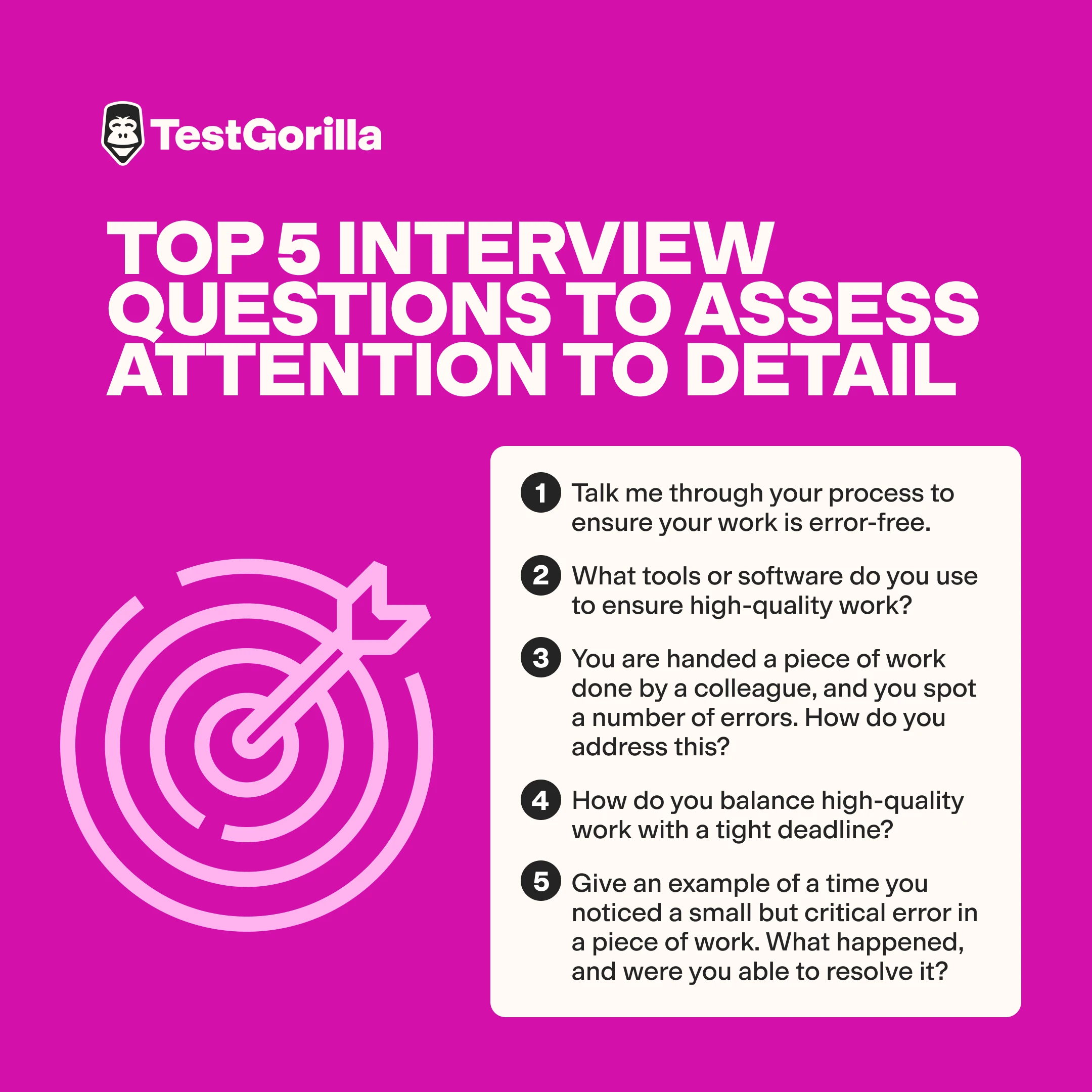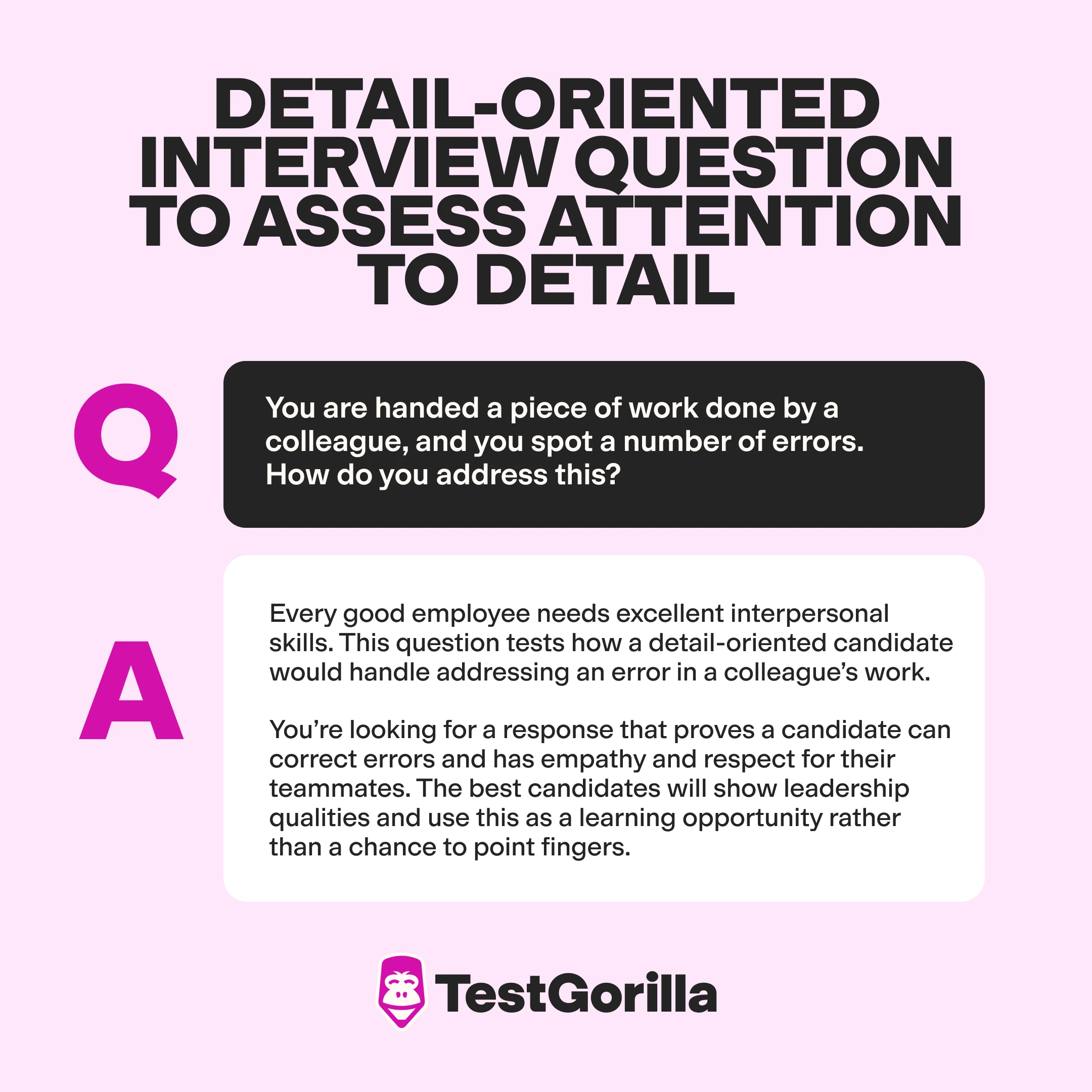Have you ever received an email in which your name is spelled incorrectly? Or, booked a service, and the date on the confirmation email is wrong? These errors can look unprofessional and hurt your business efforts.
Often overlooked by employers, attention to detail is one of the most important traits a new employee can have. Fortunately, we’ve outlined a number of key interview questions to help you find the best, most detail-oriented candidates out there.
Key takeaways
Attention to detail is a critical but often overlooked skill sought after during hiring processes.
Abilities like being able to notice small errors in a sequence of numbers, quickly identify typos, and spot inconsistencies in information are all examples of having attention to detail.
The most effective way to assess this skill in candidates is to use a combination of attention-to-detail interview questions, real-life task simulations, and pre-employment testing.
Top 5 interview questions to assess attention to detail
These five questions are the quickest and clearest way to filter out the highest quality, detail-oriented candidates. You’re off to a good start if they can answer these questions:
Talk me through your process to ensure your work is error-free.
What tools or software do you use to ensure high-quality work?
You are handed a piece of work done by a colleague, and you spot a number of errors. How do you address this?
How do you balance high-quality work with a tight deadline?
Give an example of a time you noticed a small but critical error in a piece of work. What happened, and were you able to resolve it?
How to assess attention to detail before an interview
Before interviewing applicants, the best way to filter through applications and measure attention to detail is to ask candidates to take an Attention to Detail test.
TestGorilla provides two separate attention-to-detail screening tests: one for textual detail and one for visual detail. Both assessments evaluate applicants’ abilities to:
Be attentive and meticulous
Pay attention to important details
Find errors or discrepancies in text or images
Double-check their answers
The test results will show candidates' capacity for analytical and detailed thinking. You can compare results and create a benchmark to see who came out on top.
For a more holistic picture, combine it with up to four other tests from our test library to gain an in-depth assessment of your applicants’ skills. TestGorilla’s huge array of accurate and objective pre-employment tests are proven to evaluate potential candidates effectively and extensively, leaving you free to interview only the best applicants.
Plus, our candidate assessment software requires little supervision from you. Applicants take the test themselves – which in itself shows strong organizational skills – while you simply need to check the results at the end.
You can then invite the top performers for an interview, safe in the knowledge that these candidates have already proven themselves to be detail-oriented.
The best insights on HR and recruitment, delivered to your inbox.
Biweekly updates. No spam. Unsubscribe any time.
12 detail-oriented interview questions
To help you streamline your hiring process, we’ve collated 12 insightful attention-to-detail interview questions to assess this business critical skill. You can use them for a variety of job roles and industries to sort the detail-oriented candidates from those who don’t make the grade.
Each attention-to-detail interview question includes the kinds of responses to look for and what to expect from a detail-oriented person.
1. Talk me through your process to ensure your work is error-free.
All candidates will have different methods for ensuring quality and accuracy in their work. Different strategies work well for different people, but the important thing for an interviewer is to understand that a candidate has a tried-and-tested process for ensuring quality.
Using a conversational tone invites candidates to open up and share their personal approaches in a way that feels natural and authentic. Some may use tools and software to reveal small errors they might have missed, while others will employ a rigorous proofreading process.
By asking this question in a conversational way, you encourage candidates to share the ‘how’ behind their approach rather than just stating what they do.
2. Tell me about a time you made a mistake in your work. How did you fix it, and what steps did you take to prevent this from happening again?
Ideal candidates won’t just admit to their mistakes; they will provide details of what they did to address them, what they learned from such instances, and how they implemented preventative measures.
By demonstrating that they can learn from their mistakes, interviewees will show they can both handle criticism and ensure their future work pertains to an even higher standard of quality.
3. What tools or software do you use to ensure high-quality work?
For most job roles, having an employee who both understands and uses quality-assurance tools can be a huge benefit.
The tools will depend on the type of work and the specific tasks. For example, Grammarly, Hemmingway, or text-to-voice tools can help spot small errors and typos in emails, presentations, or articles.
The best candidates can explain why certain tools are their go-to, how they fit into their workflow, and even share examples of how they have helped them catch errors or polish their work.
4. How do you handle distractions in the workplace?
Distractions are an unavoidable annoyance in the workplace. However, top candidates who strive to produce high-quality work will develop coping strategies to handle distractions constructively. These might include taking regular, short, two-minute breaks to retain focus or turning off their email and chat notifications for blocks of time, for example.
Stay open-minded about how candidates answer this question. Those who experience neurodiversity, like Attention Deficit Hyperactivity Disorder (ADHD) or Autism Spectrum Disorder (ASD), may have unique and creative strategies for managing distractions that you might not have considered.
For example, they may use noise-canceling headphones, rely on task management apps, or set up their workspace to minimize sensory overload. What’s important here is not prejudging their answers but instead seeking to understand how they stay productive and focused, even in challenging environments.
5. Are you a detail-oriented person? How is this reflected in your work?
Sometimes, it’s best just to ask a simple and direct question. Most candidates will say ‘yes’ simply because they know this should be the right response, so it’s important to follow up with the second part of the question.
An ideal response will give an in-depth account of how a candidate works with great attention to detail and how they produce work that reflects this, including specific examples.
6. You are handed a piece of work done by a colleague, and you spot a number of errors. How do you address this?
Every good employee needs excellent interpersonal skills. This question tests how a detail-oriented candidate would handle addressing an error in a colleague’s work.
You’re looking for a response that proves a candidate can correct errors and has empathy and respect for their teammates. The best candidates will show leadership qualities and use this as a learning opportunity rather than a chance to point fingers.
7. You spot a mistake in your manager’s work. How do you address this with them?
In a similar vein to the last question, you want to get an idea of a candidate’s interpersonal skills and how they handle difficult conversations. Also, you can get a sense of how they respond to management.
An ideal candidate would show that they’d handle the situation with dignity and warmth, doing their best to point out the error without patronizing or undermining a senior figure – and doing so in private.
8. How do you balance high-quality work with a tight deadline?
Sometimes, large volumes or high-quality work are needed at short notice. This is every perfectionist’s worst nightmare. But it’s also a chance to see how a candidate handles pressure and prioritizes effectively.
The best answers will show they know how to stay calm under fire, focus on the most critical tasks, and maybe even delegate or collaborate when needed.
People have different values in this situation, but a detail-oriented employee will always find ways to maintain exceptional quality despite unexpected deadlines.
9. Tell me about a typical day in your last job.
We’ve included this question because it’s an inventive way of discovering a candidate’s personality. A detail-oriented interviewee will give a brief but precise account of a typical day in their previous position. Look out for a coherent and logical structure while noting any generic or vague answers.
10. Why do you want to work for us?
A typical interview question, but one that can provide insight into a candidate’s attention to detail. You will obviously want to see that they’re invested in the role they’re applying for, but this question also uncovers whether they’ve done any detailed research and what information they have retained about your company.
11. Have you ever worked on a project that required extreme attention to detail?
This is a great way of finding out more about a candidate’s previous work experience and whether they have been required to be attentive and meticulous in the past.
This is an especially important question to ask if you’re interviewing for a detail-oriented position or if the role handles high-stakes material, such as legal documents or advertising copy, as a tiny slip-up could lead to drastic consequences.
12. Give an example of a time you noticed a small but critical error in a piece of work. What happened, and were you able to resolve it?
The devil’s in the details, and sometimes, the smallest mistakes can have the biggest impact. Take the case of NASA’s Mariner 1. Shortly after takeoff, the spacecraft veered off course and had to be destroyed. The lapse in communication between the probe and its guidance systems was traced back to the absence of a single hyphen in its coding, showing just how important attention to detail is.
The best answers will highlight how a candidate spotted the error, why it was important, and the steps they took to fix it. Bonus points if they can share how their actions made a big difference in the end result.
Find and hire detail-oriented applicants with the right skills tests and interview questions
Finding applicants who are attentive to detail is much easier if you have the right assessment tools at hand.
Skills tests, such as TestGorilla’s Attention to Visual Detail and Attention to Textual Detail tests, enable you to sift through applications and assess applicants’ abilities objectively and quickly.
Then, you simply need to invite the best performers to an interview and see who really has what it takes to become a part of your team. And for this, you need to ask the right questions, like the ones from this article.
Hire detail-oriented people quickly and efficiently with the help of TestGorilla. Sign up for your free trial today and see the difference it can make to your hiring campaigns.
FAQs
What is attention to detail?
Attention to detail is the skill of noticing small details and errors in a piece of work or a process that others might overlook.
Is attention to detail a hard or soft skill?
Attention to detail is a soft skill that isn’t technical or teachable. It can be improved through practice, but it takes focus and patience.
How do you measure attention to detail?
Attention to detail skills can be measured through pre-employment testing, behavioral interview questions, and practical tasks that mimic real-world scenarios.
You've scrolled this far
Why not try TestGorilla for free, and see what happens when you put skills first.
















